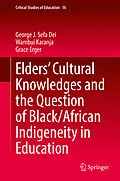This book makes a strong case for the inclusion of Indigenous Elders' cultural knowledge in the delivery of inclusive education for learners who are members of minority communities. It is relevant to curriculum developers, teachers, policy makers and institutions that engage in the education of Black, Indigenous, Latinx and other minority students. This book provides opportunities for exploring the decolonization of educational approaches. It promotes the synthesis of multiple types of knowledge and ways of knowing by making a case for the incorporation of Indigenous knowledges and Indigenous Elders as teachers in learning spaces. The book is of interest to educators, students, and researchers of Indigenous knowledge and decolonizing education. Additionally, it is important for educational policy makers, especially those engaged in looking for strategic solutions to bridging educational disparities and gaps for Indigenous, Black, Latinx and other minority learners.
Inhalt
Chapter 1: ARTICULATING THE EPISTEMIC CHALLENGE
In this chapter, we articulate the epistemic challenge and how one responds to the challenge. We take up the assertion that, We are all entitled to a degree of self-centrism. However, the question is not whether non-dominant thinking [bodies of knowledge] can reach a self-consciousness and evident neutrality, but rather, engaging such knowledge as intellectual resistance & subversion for the main purpose of offering alternative [complementary or contradictory] visions of reality more rooted in the lived experiences of African peoples (Dabeshi, 2014; pp. 3-4).
Chapter 2: INDIGENEITY AND THE CHALLENGE OF DECOLONIAL EDUCATION
Chapter 2 will examine counter-hegemonic knowledge production in the [Western] academy and the responsibilities of Black/Indigenous/racialized scholars coming to know and producing knowing to challenge the particularly of Western science knowledge that masquerades as universal knowledge in academia. We engage the chapter from a stance examining the coloniality of knowledge in academia, finding ways to centre Indigenous and African Elders' cultural knowledge systems in the academy as a way to disrupt Euro-colonial hegemonic knowledging. We ask: how do we challenge the 'grammar of coloniality' of Western knowledge and affirm the possibilities of a re-imagining of new geographies & cartographies of knowledge (Raghuram, 2017) as varied and intersecting ontologies & epistemologies that inform our human condition as learning experiences, research and knowledge generation practices (see Lebakeng 2010; p. 28, citing Teffo, 2002)? We take up the Mignolo and others conceptualization of 'decoloniality' drawing convergences and divergences with anti-colonial education highlighting how the claim of Indigeneity complicate such discussions in multiple geo-spaces.
Chapter 3: WHERE WE ARE COMING FROM?
In this chapter, we develop a case for where we are coming from and interrogate, noting and highlighting some issues and questions:
a) Knowledge exclusions/coloniality of 'science [e.g., what constitutes knowledge? the 'science'/Indigenous binary? etc.].
b) Is there a place for 'bodily ways of knowing' in the academy [in the search for episteme in dialogue]?
c) Primitivizing the 'Other' [e.g., the genealogies of Black/African intellectual thought].d) The resistance to claims of Black/African Indigeneity.
e) Redefining Indigenous/Indigeneity & the relationship to the question of the Land [i.e., decolonization is also about resisting 'imperial consciousness'].
f) Taking up Elders' cultural knowledges as pedagogies of social liberation?
g) African Elders' knowledge as 'sub-intern'of place/site/location & source of Indigenous cosmologies & episteme, consisting of worldsenses [Oyewumi, 1977] & new geographies of knowledge [Raghuram, 2017].
h) The 'rhetoric' and 'myth' of modernity - schooling & education deny the power of Elders' cultural knowledges as decolonial difference.
Chapter 4: ASKING QUESTIONS
In this chapter, we identify some key probing questions that guide the objectives of this book:
a) How do we come to understand African Elders' cultural knowledge as Indigenous epistemology?
b) What specific Elders' teachings relating to community, social responsibility, environment, Land, social justice, equity, youth leadership, respect, and mutual interdependence can be identified pointing to the implications for youth schooling and education (including educational policy)?
c) What are the pedagogic, instructional and communicative challenges of Elders...
